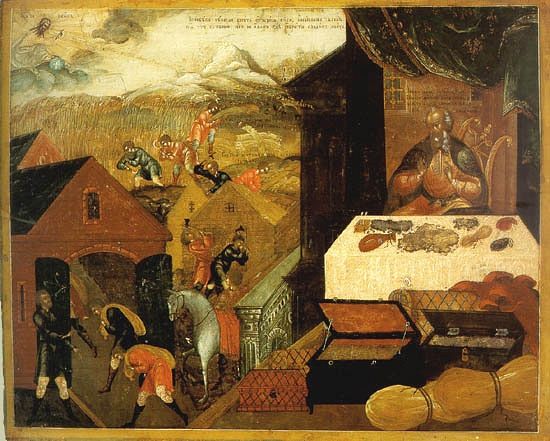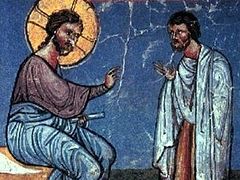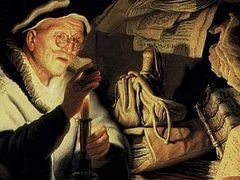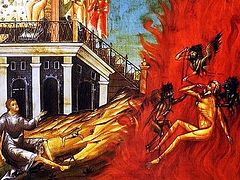Thou fool, this night thy soul shall be required of thee. (Luke 12:20)
I would like to share with you a dramatic little story that is significantly relevant in its implications and profoundly meaningful in its conclusions. It is the story of a man who by all modern standards would be considered eminently successful. Yet Jesus called him a fool. The central character in the drama is a "certain rich man," whose farm yielded such heavy crops that he decided to build new and larger barns, saying, "There will I bestow all my fruits and my goods. And I will say to my soul, Soul, thou hast much goods laid up for many years; take thine ease, eat, drink, and be merry." But God said to him, “Thou fool, this night thy soul shall be required of thee." And it was so. At the height of his prosperity, he died. Think of this man. If he lived in our community today, he would be considered "a big shot." He would abound with social prestige and community respectability. He would be one of the privileged few in the economic power structure. And yet a Galilean peasant had the audacity to call him a fool. Jesus did not call this man a fool merely because he possessed wealth. Jesus never made a sweeping indictment against wealth. Rather, he condemned the misuse of wealth. Money, like any other force such as electricity, is amoral and can be used for either good or evil. It is true that Jesus commanded the rich young ruler to “sell all,” but in this instance, as Dr. George A. Buttrick has said, Jesus was prescribing individual surgery, not making a universal diagnosis. Nothing in wealth is inherently vicious, and nothing in poverty is inherently virtuous. Jesus did not condemn this man because he had made money in a dishonest fashion. Apparently he acquired his wealth by hard work and the practical know-how and far-sighted vision of a good businessman. Why, then, was he a fool?
The rich man was a fool because he permitted the ends for which he lived to become confused with the means by which he lived. The economic structure of his life absorbed his destiny. Each of us lives in two realms, the internal and the external. The internal is that realm of spiritual ends expressed in art literature, morals, and religion. The external is that complex of devices, techniques, mechanisms, and instrumentalities by means of which we live. These include the house we live in, the car we drive, the clothes we wear, the economic sources we acquire -- the material stuff we must have to exist. There is always a danger that we will permit the means by which we live to replace the ends for which we live, the internal to become lost in the external. The rich man was a fool because he failed to keep a line of distinction between means and ends, between structure and destiny. His life was submerged in the rolling waters of his livelihood. This does not mean that the external in our lives is not important. We have both a privilege and a duty to seek the basic material necessities of life. Only an irrelevant religion fails to be concerned about man's economic well-being. Religion at its best realizes that the soul is crushed as long as the body is tortured with hunger pangs and harrowed with the need for shelter. Jesus realized that we need food, clothing, shelter, and economic security. He said in clear and concise terms: "Your Father knows what things you have need of." But Jesus knew that man was more than a dog to be satisfied by a few economic bones. He realized that the internal of a man's life is as significant as the external. So he added, "Seek ye first the kingdom of God, and his righteousness; and all these things shall be added unto you." The tragedy of the rich man was that he sought the means first, and in the process the ends were swallowed in the means. The richer this man became materially the poorer he became intellectually and spiritually. He may have been married, but he probably could not love his wife. It is possible that he gave her countless material gifts, but he could not give her that which she needed most, love and affection. He may have had children, but he probably did not appreciate them. He may have had the great books of the ages shelved neatly in his library, but he never read them. He may have had access to great music, but he did not listen. His eyes did not behold the majestic splendor of the skies. His ears were not attuned to the melodious sweetness of heavenly music. His mind was closed to the insights of poets, prophets, and philosophers. His title was justly merited -- "Thou fool!"
The rich man was a fool because he failed to realize his dependence on others. His soliloquy contains approximately sixty words, yet "I" and "my" occur twelve times. He has said "I" and "my" so often that he had lost the capacity to say "we" and "our." A victim of the cancerous disease of egotism, he failed to realize that wealth always comes as a result of the commonwealth. He talked as though he could plough the fields and build the barns alone. He failed to realize that he was an heir of a vast treasury of ideas and labor to which both the living and the dead had contributed. When an individual or a nation overlooks this interdependence, we find a tragic foolishness. We can clearly see the meaning of this parable for the present world crisis. Our nation's productive machinery constantly brings forth such an abundance of food that we must build larger barns and spend more than a million dollars daily to store our surplus. Year after year we ask, "What shall I do, because I have no room where to bestow my fruits?" I have seen an answer in the faces of millions of poverty-stricken men and women in Asia, Africa, and South America. I have seen an answer in the appalling poverty on the Mississippi Delta and the tragic insecurity of the unemployed in large industrial cities of the North. What can we do? The answer is simple: feed the poor, clothe the naked, and heal the sick. Where can we store our goods? Again the answer is simple: we can store our surplus food free of charge in the shriveled stomachs of the millions of God's children who go to bed hungry at night. We can use our vast resources of wealth to wipe poverty from the earth. All of this tells us something basic about the interdependence of men and nations. Whether we realize it or not, each of us is eternally "in the red." We are everlasting debtors to known and unknown men and women. We do not finish breakfast without being dependent on more than half of the world. When we arise in the morning, we go into the bathroom where we reach for a sponge which is provided for us by a Pacific Islander. We reach for soap that is created for us by a Frenchman. The towel is provided by a Turk. Then at the table we drink coffee which is provided for us by a South American, or tea by a Chinese, or cocoa by a West African. Before we leave for our jobs we are beholden to more than half the world. In a real sense, all life is interrelated. All men are caught in an inescapable network of mutuality, tied in a single garment of destiny. Whatever affects one directly affects all indirectly. I can never be what I ought to be until you are what you ought to be, and you can never be what you ought to be until I am what I ought to be. This is the interrelated structure of reality. The rich man tragically failed to realize this. He thought that he could live and grow in his little self-centered world. He was an individualist gone wild. Indeed, he was an eternal fool!
Jesus called the rich man a fool because he failed to realize his dependence on God. He talked as though he unfolded the seasons and provided the fertility of the soil, controlled the rising and the setting of the sun, and regulated the natural processes that produce the rain and the dew. He had an unconscious feeling that he was the Creator, not a creature. This man-centered foolishness has had a long and oftentimes disastrous reign in the history of mankind. Sometimes it is theoretically expressed in the doctrine of materialism, which contends that reality may be explained in terms of matter in motion, that life is "a physiological process with a physiological meaning," that man is a transient accident of protons and electrons traveling blind, that thought is a temporary product of gray matter, and that the events of history are an interaction of matter and motion operating by the principle of necessity. Having no place for God or for eternal ideas, materialism is opposed to both theism and idealism. This materialistic philosophy leads inevitably into a dead-end street in an intellectually senseless world. To believe that human personality is the result of the fortuitous interplay of atoms and electrons is as absurd as to believe that a monkey by hitting typewriter keys at random will eventually produce a Shakespearean play. Sheer magic! It is much more sensible to say with Sir James Jeans, the physicist, that "the universe seems to be nearer to a great thought than to a great machine," or with Arthur Balfour, the philosopher, that "we now know too much about matter to be materialists." Materialism is a weak flame that is blown out by the breath of mature thinking. Another attempt to make God irrelevant is found in non-theistic humanism, a philosophy that deifies man by affirming that humanity is God. Man is the measure of all things. Many modern men who have embraced this philosophy contend, as did Rousseau, that human nature is essentially good. Evil is to be found only in institutions, and if poverty and ignorance were to be removed everything would be all right. The twentieth century opened with such a glowing optimism. Men believed that civilization was evolving toward an earthly paradise. Herbert Spencer skillfully molded the Darwinian theory of evolution into the heady idea of automatic progress. Men became convinced that there is a sociological law of progress which is as valid as the physical law of gravitation. Possessed of this spirit of optimism, modern man broke into the storehouse of nature and emerged with many scientific insights and technological developments that completely revolutionized the earth. The achievements of science have been marvelous, tangible and concrete. Witnessing the amazing advances of science, modern man exclaimed:
Science is my shepherd; I shall not want.
It maketh me to lie down in green pastures:
It leadeth me beside the still waters.
It restoreth my soul.
I will fear no evil: for science is with me;
Its rod and its staff they comfort me.
Man's aspirations no longer turned Godward and heavenward. Rather, man's thoughts were confined to man and earth. And man offered a strange parody on the Lord's Prayer:
"Our brethren which art upon the earth, Hallowed be our name. Our kingdom come. Our will be done on earth, for there is no heaven."
Those who formerly turned to God to find solutions for their problems turned to science and technology, convinced that they now possessed the instruments needed to usher in the new society. Then came the explosion of this myth. It climaxed in the horrors of Nagasaki and Hiroshima and in the fierce fury of fifty-megaton bombs. Now we have come to see that science can give us only physical power, which, if not controlled by spiritual power, will lead inevitably to cosmic doom. The words of Alfred the Great are still true: "Power is never a good unless he be good that has it." We need something more spiritually sustaining and morally controlling than science. It is an instrument that, under the power of God's spirit, may lead man to greater heights of physical security, but apart from God's spirit, science is a deadly weapon that will lead only to deeper chaos. Why fool ourselves about automatic progress and the ability of man to save himself? We must lift up our minds and eyes unto the hills from whence comes our true help. Then, and only then, will the advances of modern science be a blessing rather than a curse. Without dependence on God our efforts turn to ashes and our sunrises into darkest night. Unless his spirit pervades our lives, we find only what G.K. Chesterton called “cures that don't cure, blessings that don't bless, and solutions that don't solve.” “God is our refuge and strength, a very present help in trouble."
Unfortunately, the rich man did not realize this. He, like many men of the twentieth century, became so involved in big affairs and small trivialities that he forgot God. He gave the finite infinite significance and elevated a preliminary concern to ultimate standing. After the rich man had accumulated his vast resources of wealth -- at the moment when his stocks were accruing the greatest interest and his palatial home was the talk of the town -- he came to that experience which is the irreducible common denominator of all men, death. The fact that he died at this particular time adds verve and drama to the story, but the essential truth of the parable would have remained the same had he lived to be as old as Methuselah. Even if he had not died physically, he was already dead spiritually. The cessation of breathing was a belated announcement of an earlier death. He died when he failed to keep a line of distinction between the means by which he lived and the ends for which he lived and when he failed to recognize his dependence on others and on God. May it not be that the "certain rich man" is Western civilization? Rich in goods and material resources, our standards of success are almost inextricably bound to the lust for acquisition. The means by which we live are marvelous indeed. And yet something is missing. We have learned to fly the air like birds and swim the sea like fish, but we have not learned the simple art of living together as brothers. Our abundance has brought us neither peace of mind nor serenity of spirit. An Oriental writer has portrayed our dilemma in candid terms:
“You call your thousand material devices ‘labor-saving machinery,’ yet you are forever ‘busy.’ With the multiplying of your machinery you grow increasingly fatigued, anxious, nervous, dissatisfied. Whatever you have, you want more; and wherever you are you want to go somewhere else. You have a machine to dig the raw material for you, a machine to manufacture [it], a machine to transport [it], a machine to sweep and dust, one to carry messages, one to write, one to talk, one to sing, one to play at the theater, one to vote, one to sew, and a hundred others to do a hundred other things for you, and still you are the most nervously busy man in the world. Your devices are neither time-saving nor soul-saving machinery. They are so many sharp spurs which urge you on to invent more machinery and to do more business.”
This is poignantly true and tells us something about Western civilization that cannot be cast aside as a prejudiced charge by an Oriental thinker who is jealous of Occidental prosperity. We cannot escape the indictment. The means by which we live have outdistanced the ends for which we live. Our scientific power has outrun our spiritual power. We have guided missiles and misguided man. Like the rich man of old, we have foolishly minimized the internal of our lives and maximized the external. We have absorbed life in livelihood. We will not find peace in our generation until we learn anew that "a man's life consists not in the abundance of the things which he possesses," but in those inner treasuries of the spirit which "no thief approaches, neither moth corrupts." Our hope for creative living lies in our ability to re-establish the spiritual ends of our lives in personal character and social justice. Without this spiritual and moral reawakening we shall destroy ourselves in the misuse of our own instruments. Our generation cannot escape the question of our Lord:
What shall it profit a man, if he gain the whole world of externals -- airplanes, electric lights, automobiles, and color television -- and lose the internal -- his own soul?





